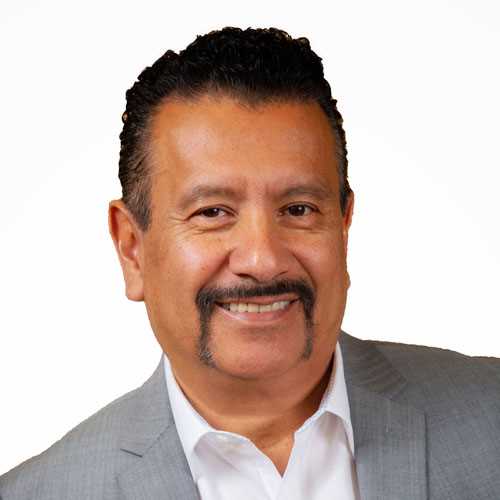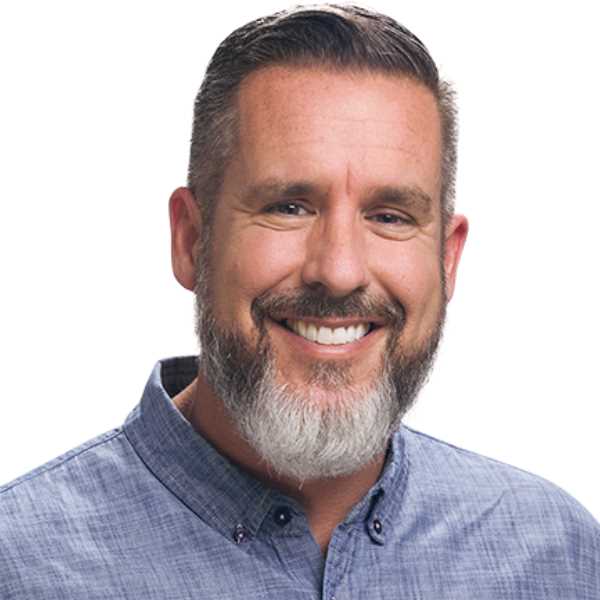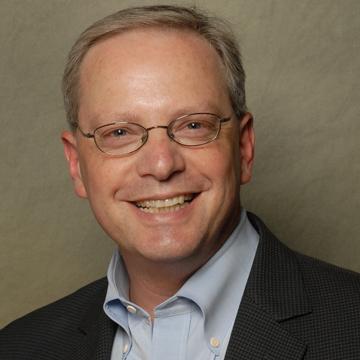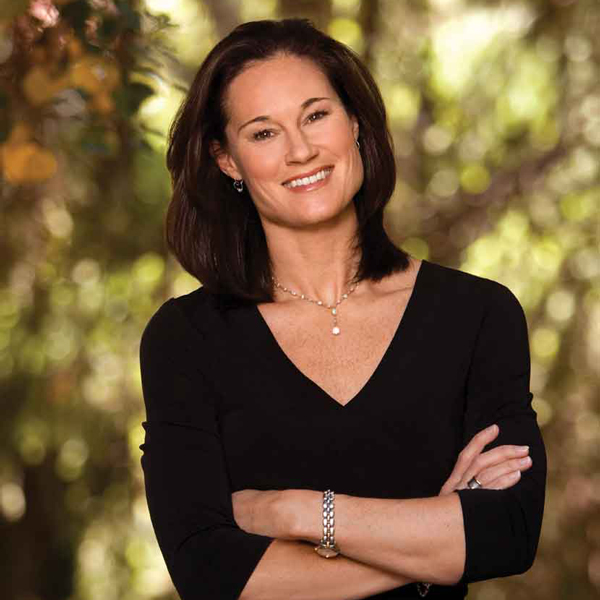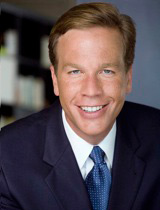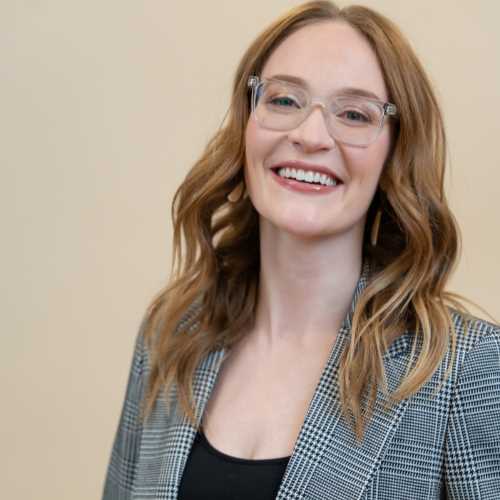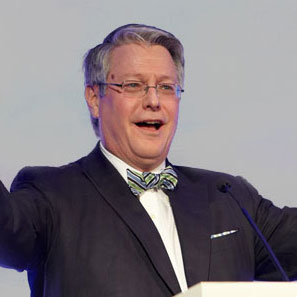
Thorton May Speaker Biography
Thornton May is a futurist, educator and author. His extensive experience researching and consulting on the role and behaviors of “C” level executives in creating value with information technology has won him an unquestioned place on the short list of serious thinkers on this topic. Thornton combines a scholar’s patience for empirical research, a stand-up comic’s capacity for pattern recognition and a second-to-none gift for storytelling to address the information technology management problems facing executives. The editors at eWeek honored Thornton, including him on their list of Top 100 Most Influential People in IT. The editors at Fast Company labeled him ‘one of the top 50 brains in business.’
Thornton has established a reputation for innovation in time-compressed, collaborative problem-solving. Thornton designs the curriculum that enables the mental models that allow organizations to outperform competitors, delight customers and extract maximum value from tools and suppliers. He specializes in creating action-based learning spaces for high performance organizations. He ran the multi-client research program at the Nolan Norton Institute and led the Management Lab at Cambridge Technology Partners. He co-founded the Olin Innovation Lab and co-manages the CIO Solutions Gallery at THE Ohio State University.
Thornton’s insights have appeared in the Harvard Business Review (on IT strategy); The Financial Times (on IT value creation); The Wall Street Journal (on the future of the computer industry); the M.I.T. Sloan Management Review (on the future of marketing), American Demographics (on the evolving demographics of Electronic Commerce), USA Today (on the future of the consumer electronics industry), Business Week (on the future of CEO direct reports) and on National Public Radio (debating the future practice of strategy with Professor Michael Porter). Thornton is a columnist at Computerworld and has served as an Advisor to the Founding Editors of Fast Company Magazine.
Thornton’s research has been acknowledged in such seminal business books as Seth Godin's Permission Marketing; Michael Schrage's Serious Play: How the World's Best Companies Simulate to Innovate; Moshe Rubenstein's The Minding Organization; Bill Jensen's Simplicity; and Jeff Williams' Renewable Advantage: Crafting Strategy Through Economic Time.
Thornton’s book, The New Know: Innovation Powered by Analytics, analyzes what organizations know, how they come to know and how they act upon what they know/don’t know.
Thornton obtained his bachelor’s degree in Asian Studies from Dartmouth College and his master’s degree in Industrial Administration from Carnegie-Mellon University.
The New Know: Understanding and Managing the Big Data & Analytics
In a simpler time executives made decisions based on what happened in the past. In today's environment, however, leaders need a working knowledge of what happens next. To do that requires real-time, insightful data, or more specifically, analytics and Big Data. Identifying and harnessing the right analytics, however, is a struggle within any organization given the vast amounts of information available, the different technologies at work, and the divergent personalities who own the data. Futurist Thornton May offers solutions from his book, The New Know: Innovation Powered by Analytics on how to identify where analytics and Big Data sit within an organization, deal with a new breed of analysts, and optimize current technology to link analytics to innovation.
Bright Futures: The Unbeatable Combination of Innovation and Analytics
Procter & Gamble is investing heavily in ‘decision cockpits.’ Kaiser Permanente collaborates with patients in creating personal health forecasts. Harrah’s Entertainment quantifies the value of smiles on gamblers. MITRE has decimal point awareness of ‘who knows what’ in their network. Kimberly Clark saves $30 million with a $15,000 investment. Dunhumby USA analyzes the transactions of 350 million global customers. Business analytics is redefining The New Know—what can be known/what must be known. Analytics is transforming the global workspace. Some think that analytics may be ‘the Noah’s Ark’ that saves IT. Join Thornton May for a high energy, high impact workshop on the value that analytics can create.
A Strategy for Innovation
With humor, provocative frameworks and new data, Thornton A. May, will engage in a highly interactive workshop on Innovation. He will showcase new research regarding what ahead-of-the-curve enterprises are doing to expand their capacity for innovation. At the Stanford Business School, as May points out, Bill Hewlett teased professors that Hewlett-Packard was "successful because we had no plans." At the Harvard Business School, Mike Porter said that the only way to compete was not to compete, to become a monopolist. Today, east coast, west coast, and international business schools have concluded that regions, organizations, and individuals must have a strategy for innovation. Leaders find themselves at a critical point and status quo business models are struggling. Productivity gains and payback associated with "inside-the-box? solutions appear to be flattening out. Does this mean that the old way of thinking, knowing, doing, and computing are just about kaput? We find ourselves at a technology and business model inflection point. What are you going to do?
Jumping the Curve—Managing the Transition from Now to Next
We have come to a critical decision point. Is this the end of the current way of doing things? Status quo business models are struggling. Productivity gains and payback associated with ‘inside-the-box’ technology solutions appear to be flattening out. Does this mean that the old way of thinking, ‘knowing’, doing and computing are just about kaput? Mainframes gave way to minicomputers gave way to PCs gave way to client server gave way to the web…We find ourselves at a technology and business model inflection point. Is it time to ‘kick over the chessboard’? What are you going to do?
A New Kind of Leader for a New Kind of World
At inflection points in history [1453 -Fall of Constantinople; 1492 -Discovery of the New World; 1860 -Election of Lincoln; and 1919 -Treaty of Versailles] a new kind of leadership emerges. We are now at such an inflection point. Extensive research has surfaced five new "knowledges" leaders must master if they are to remain relevant to the modern enterprise. High performance organizations are in the midst of exfoliating a leadership cohort adept at answering questions, but not so great at knowing how to ask them; who can fulfill goals, but don’t know how to set them; and who think about how to get things done, but not whether they’re worth doing in the first place. Success during moments of fundamental change requires finding a new direction, not marching at the front of a herd that’s heading toward the cliff. Thornton May will introduce you to the new set of ideas and a new cadre of thought leaders now animating world class organizations.
Re-imagining IT Leadership: Surviving Now, Managing Next & Preparing for Later
Society in general, the economy in particular and information technology leadership specifically are at an inflection point. An inflection point, according to former Intel chairman Andy Grove, "occurs where the old strategic picture dissolves and gives way to the new." Mitchell Joachim, Professor at MIT when queried about the future responded, "I’m counting on being surprised". CIOs face the unique challenge of being asked to simultaneously avoid and create "strategic surprise".
Hercules had twelve "Labors." Dante traversed nine circles of hell. And the hero of the emerging value drama—the modern IT executive will face at least four steep and disruptive technology learning curves: Big Data, Mobility, Social Media and the Cloud. In the cloud space alone analysts document that there are more than 2,000 software-as-a-service [S-a-a-s] vendors clamoring for attention.
A robust set of new technologies and practices offers those who would lead unprecedented degrees of freedom regarding where computational resources are located and how information services are delivered. Social/mobile technologies expand the populations creating and consuming content. Big Data and analytics transform what is and what must be known. Senior management has radically altered their perceptions of the value information managers and management can and must create.
Just as your technology platform requires regularly scheduled updates so too does your leadership tool kit. IT leadership needs to be re-imagined. Thornton May will lead the best-and-the-brightest of the technology world in a high-energy and highly interactive workshop designed to surface how to best prepare for the new world.
Managing Technology Futures
Al Toffler [futurist and author of Future Shock] believes, "the future arrives at the wrong time, in the wrong order and no straight-line extrapolation is ever accurate." Clayton Christensen [Harvard professor] suggests, "Stop trying to predict the trajectories of disruptive technologies because predictions just won’t work." If we can’t extrapolate and we can’t predict, what options remain open to future-focused executives faced with technology decisions?
Very few organizations have shown themselves proficient at prospicience—the act of looking forward. Few have mastered the art of extracting full-value from the technology they have purchased. And only a micro-minority have been successful at applying the technology loofa to exfoliate legacy systems which have outlived their usefulness. This session will showcase best practices associated with managing the 'what comes next portion of the technology life cycle."
Managing Healthcare Futures
Thornton May, futurist and classically trained cultural anthropologist is breaking exciting new ground undertaking an ethnographic analysis of the modern healthcare tribe. He is fortunate to advise, lecture and always learn from professionals at healthcare organizations such as Kaiser-Permanente, Cardinal Health, the Mayo Clinic, Medtronics, and Yale-New Haven Health System. In this session Thornton will engage the audience in a highly interactive conversation regarding the transformation now taking place in healthcare.
The Future of Security and Privacy
In the much simpler world of 30 years ago, Coca Cola assembled 200 multi-ethnic youngsters on a hilltop in Italy and had them sing. The message—the whole world could be united in its desire for a single product. While the world might be able to coalesce in its desire for a carbonated beverage, it certainly can't make up its mind what we need to know, who needs to know it, who should be teaching and how security and privacy best practices should be taught.
It has become common knowledge that all stakeholders in the enterprise should 'know a little something' about security and privacy. Procter & Gamble has decided that privacy will be as much a vital part of Tide as the chemicals in the box, as much a part of Pampers as the paper and plastic, as much a part of Maxwell House as the beans...What has your company or agency decided?
The original business plan at Amazon.com is reputed to state, "We will sell a low-touch commodity product (like books) via a process that allows us to extract information that will form the base of follow-on high value services..." At the base of the information age is information management. At the base of information management is the question: "How much information about your customer will you be allowed to collect and repackage?" At the base of this question lies the practice of security and privacy.
Everyone knows there's a security/privacy tug-of-war going on in the minds of the public. Nobody seems to know what to do about it. Everyone knows buyers care about their personal information... nobody knows how far they will go to protect it. Everyone knows buyers can be tempted to trade private data for personal gain... nobody can figure out the nature of such trade-offs.
We live at a time of unique opportunity to change how we think and do digital security and privacy. This is sure to be an informative and entertaining session that you won't want to miss!
The Transformed & Transforming Chief Information Security Officer
There is a security industry. There is a security tribe. And then there are the REST OF US. Rather than calculating R.O.I.’s on security spending, high-performance CISO’s would be well advised to calibrate R.O.U.’s [Rest-of-Us calibrations]. Every year roughly 153 million Americans go to work in approximately 13 million enterprises. The vast majority does not start their day or do their work thinking about information security. How can the security organization create a sense of shared consciousness and purpose regarding practicing "safe" information management with a multi-generational, mobilized, globalized, hyper-socialized, omni-connected, time-squeezed, and objective-obsessed workforce?
Publishers have been mis-labeled as physical book printers victimized by digital technology. In point of fact, new generation publishers serve a critical function as venture capitalists for ideas. Writers, both fiction and non-fiction have been chastised as egotistical wordsmith. The writers who last create a context in which other people can think. In a similar fashion security professionals have been mis-categorized. Many are ghettoized as enforcers who lock down assets. The emergent role of information security is to enable competitive differentiation/mission fulfillment.
People and information are the new security perimeter. A transformed and transforming CISO is the path forward. CISO’s operate in a behavioral casino. It is time they started counting the carbon-based cards.
The Road Ahead
Executives have to make decisions regarding three very distinct and interrelated time zones:
- The realities of now [current fiscal year];
- The problems/possibilities of next [36 to 60 months out]; and
- The potentials of later [visions five plus years in the future].
Most organizations allocate the vast majority of their resources to managing the now. The next and the later tend to be starved for attention and resource.
Executive teams need to achieve a better balance across all the time zones of their future.
Consumerization of IT
Consumerization can be IT’s finest moment. Yes, few can dispute that enterprise IT is no longer the sole, preferred or even a particularly respected source of computational functionality. Yes, major media outlets are constantly pointing to the differences between the cool-new-tech outside the enterprise and the bozo-slow-old tech inside the workplace. One observer going so far as to lament, "For the next generation of knowledge workers, entering the workplace often feels like entering a computer science museum."
While making for an easy-to-tell and immensely satisfying narrative, it is overly simplistic to attempt to frame consumerization as a civil war pitting the vast, fast and global consumer electronics industry against a demonized, compliance-obsessed, control-seeking, security-sensitized and severely resource-constrained internal band of IT bureaucrats in a race for the hearts, minds, handsets & tablets of a highly digitized, mobilized, virtualized and socialized global workforce. There are bigger forces at work here

